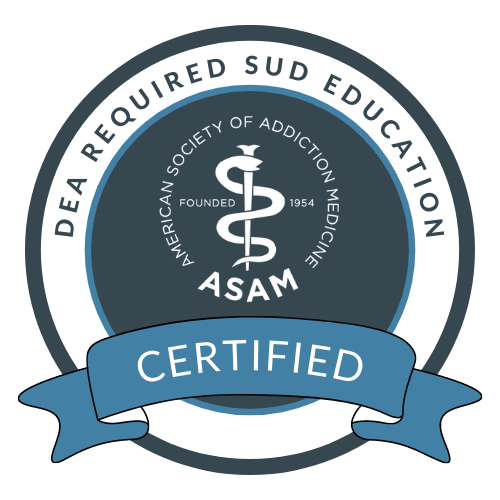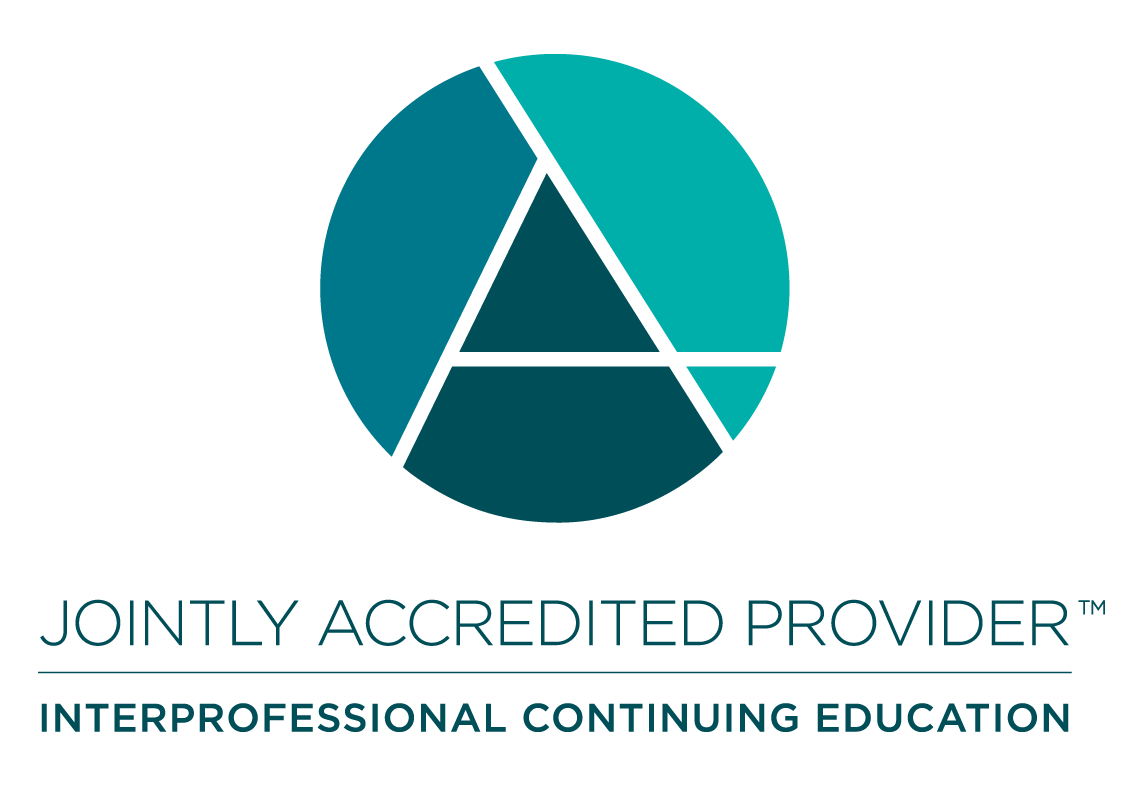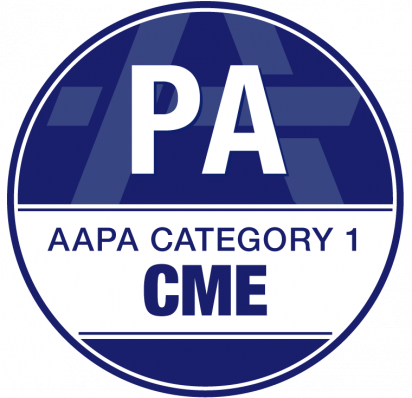
Treatment of Opioid Use Disorder Course
-
Register
- Non-Member - $199
- Regular Member - $149
- Retired - $149
- Early Career Physician - $149
- Resident - $99
- Student - $99
- Associate - $99
- ASAM Staff - Free!
- International Member - $149
- Emeritus Member - $149
- Provisional Member - $149
- Fellow Member - $149
- Honorary Member - $149
- CRT Member - $149

Treatment of Opioid Use Disorder Course
Updated: July 2024
Online Course
Overview
The ASAM Treatment of Opioid Use Disorder Course provides eight hours of education essential for providers to identify, assess, diagnose, and manage the treatment of patients with opioid use disorder (OUD). Through interactive and application-focused learning experiences, participants will explore misconceptions, stigma, and complexities associated with OUD and the use of medications to treat OUD, as well as how to address it for policies, systems, providers, and patients. Participants will gain an understanding of the epidemiology and neurobiology of opioid use disorder as well as opioid pharmacology, with a focus on medication-first treatment of OUD. Participants will examine medication and psychosocial treatment options and best practices for initiating and maintaining the treatment of OUD in hospital, office-based, and other outpatient settings. Emphasizing harm reduction or outcome-directed care, this course equips participants with the knowledge and skills to develop a low-threshold approach to the treatment of OUD. Learners will also explore the importance of collaborative care and provider partnerships with a focus on a holistic, team-based approach to treatment across the continuum of care for individuals with OUD.
The target audience for this introductory-level course includes: Physicians, Nurse Practitioners, Physician Associates, Nurses, Pharmacy and Pharmacy Technicians, Social Workers, Certified Counselors, Psychologists, Addiction Educators and Researchers, Students and Correctional Professionals and Peers.
The ACGME competencies include: Patient Care and Medical Knowledge.
Learning Objectives
Upon completion, learners will be able to:
- Examine the underlying misconceptions, stigma, and complexities associated with opioid use disorder and the use of medications to treat opioid use disorder, and how to address it for policies, healthcare systems, providers, and patients.
- Identify, assess, and diagnose patients with opioid use disorder, recognizing the potential role of medical and psychiatric comorbidities, policies, patient agency, and social determinants of health on a plan of care.
- Develop a low threshold approach to the treatment of OUD with emphasis on harm reduction or outcome-directed care.
- Develop a patient-centered treatment plan using a medication-first treatment approach.
- Monitor progress and modify treatment plan based on patient needs and progress toward treatment goals.
- Implement best practices for hospital settings, office systems, and other outpatient-based settings emphasizing team-based care to support treatment with medications for opioid use disorder.
- Implement harm reduction best practices for individuals with opioid use disorder in a range of clinical settings.
DEA Education Requirement
As an accredited organization named in Section 1263 of the Consolidated Appropriations Act of 2023, ASAM certifies that completion of this course meets the DEA requirement for 8 hours of education on substance use disorder(s).
Registration Rates
| ASAM Learner Type | Rate |
| ASAM Member | $149 |
| Non-Member | $199 |
| Associate Member | $99 |
| Resident Member* | $99 |
| Student Member* | $99 |
*Residents, Fellows-in-training, Interns, and Students must join ASAM to receive a discounted registration rate. Click here to become an ASAM member. National and Chapter membership dues apply. There is no charge for Students to become a Member, but verification of student status is required.
Membership Question? Call ASAM at 1.301.656.3920, email us, or view the ASAM website for more information.
Refunds & Cancellations
All ASAM eLearning Center refund requests must be made in writing to Education@ASAM.org within 90 days of purchase. Those requesting refunds for courses that are in progress will receive partial refunds or eLearning Center credit. Automatic full refunds will be made for any course with a live-course component that has been cancelled.
Open Registration: 07/01/2024 - 06/01/2027
Close Access Date: 07/01/2027
Instructions
- Click on the Contents tab to begin this activity.
- Click Complete Post Test to answer multiple choice questions. Participants will have 3 attempts to pass and must answer 17 out of 22 questions correctly.
- Click Complete Evaluation to provide valuable activity feedback. Scroll down on all questions as there may be answer options that expand past the size of the window.
- Click the button Claim Medical Credits in the box titled Claim Credits & Certificate. Choose the type of credit and click submit. Click the button View/Print Certificate to save or print your certificate. You can view/print your certificate at any time by visiting the ASAM eLearning Center, clicking Dashboard, and clicking Transcript/Achievements.
Need Assistance?
For assistance logging in, accessing activities, claiming credit, or for other questions or concerns, please check the FAQ page or e-mail Education@ASAM.org
ASAM is proud to offer eSSENTIAL Accessibility to ensure our website is accessible and functional for all our learners while providing free assistive technology for people with the widest possible range of abilities.
Jeffrey P. Bratberg
PharmD, FAPhA
Dr. Bratberg studies the essential and emerging roles communitypharmacists play regarding opioid overdose, harm reduction and opioid usedisorder treatment. He advocates for pharmacists’ expanded roles in medicationaccess, public health promotion, and policy change through research, practice,and teaching. He is an associate editor of the Journal of the AmericanPharmacists Association (JAPhA) and co-produces and hosts a weekly publichealth pharmacy podcast with his pharmacy students, called “The Regimen.”
No relevant financial disclosures.
Daniel A. Nauts
MD, FASAM
Dr. Daniel A. Nauts, MD, FASAM, is an addiction medicine specialist who completed his undergraduate and medical education at the University of Michigan. He has developed numerous inpatient and outpatient substance use disorder (SUD) programs and medication for opioid use disorder (MOUD) services. As an independent contractor for the Montana Primary Care Association, he provides TOUD training, community forums on opioid use disorders, and strategies for tapering high-dose opioids. Active in the American Society of Addiction Medicine (ASAM), he supports physician and nurse health through Professional Assistance Programs and offers addiction medicine training for medical residents, APRN trainees, and PA students. Dr. Nauts is on the Drug Utilization Board of Mountain Pacific Quality Health and has held leadership roles within the Northwest Society of Addiction Medicine.
No relevant financial disclosures.
Kathryn M. Basques
MSW, MSN, APRN, PMHNP-BC
Kathryn M. Basques is a psychiatric nurse practitioner specializing in Addiction Medicine and Psychiatry. After completing her education at Yale School of Nursing, she started her career at Yale-New Haven Hospital on the first pro-active psychiatric consult service. From 2015-2020, she worked at Rush University Medical Center as the Co-Director of the Substance Use Intervention Team (SUIT) and dedicated herself to promoting the early identification of substance use disorders, implementation of an SBIRT model of care in the inpatient units, and improving the management of opioid and alcohol withdrawal syndromes. Since moving to Providence, RI, in 2021, Kathryn was first within the Lifespan Hospital System, continuing to work in a combined inpatient and outpatient, co-occurring clinical role. She is currently the Lead Psychiatry Provider for CODAC, an OTP and comprehensive substance use treatment program with locations throughout Rhode Island. Her areas of interest remain advocating for harm reduction policies in the treatment setting, motivational interviewing, and management of co-occurring syndromes.
No relevant financial disclosures.
J. Deanna Wilson
MD, MPH
Dr. Wilson is an Assistant Professor of Family Medicine andCommunity Health at the University of Pennsylvania. Shereceived her MD from Yale University School of Medicine and trained in internalmedicine and pediatrics at the Johns Hopkins University School of Medicine. Shecompleted additional subspecialty training in both adolescent and addictionmedicine also at Johns Hopkins. Dr. Wilson's research interests include reducingsubstance use-related health disparities and building equity, with an emphasis oninnovative strategies to treat opioid use disorders in adolescent and adultpopulations. Her work includes integrating harm reduction into primary caresettings, developing low threshold models of care to improve engagement andretention of vulnerable populations, and improving engagement and retention ofadolescents and young adults in OUD treatment.
No relevant financial disclosures
Accreditation & Credit Designation Statements
Joint Accreditation Statement

In support of improving patient care, the American Society of Addiction Medicine is jointly accredited by the Accreditation Council for Continuing Medical Education (ACCME), the Accreditation Council for Pharmacy Education (ACPE), and the American Nurses Credentialing Center (ANCC), to provide continuing education for the healthcare team.
Physicians
The American Society of Addiction Medicine designates this enduring material for a maximum of 8 AMA PRA Category 1 Credits™. Physicians should claim only the credit commensurate with the extent of their participation in the activity.
Nurses
This activity awards 8 Nursing contact hours.
Pharmacy
TInhis activity will offer 8 pharmacy contact hours (8 CEUs). Pharmacists will be asked to provide identifying information (e-Profile ID and DOB in MMDD format) in order to receive credit and allow reporting to CPE Monitor. (UAN: JA0000141-0000-24-059-H99)

PAs
ASAM has been authorized by the American Academy of PAs (AAPA) to award AAPA Category 1 CME credit for activities planned in accordance with AAPA CME Criteria. This activity is designated for 8 AAPA Category 1 CME credits. Approval is valid until 6/01/2027. PAs should only claim credit commensurate with the extent of their participation.
Pharmacology Hours
This activity has 3 hours that satisfy the requirements for NP and PA Pharmacology Hours.
Social Workers
As a Jointly Accredited Organization, ASAM is approved to offer social work continuing education by the Association of Social Work Boards (ASWB) Approved Continuing Education (ACE) program. Organizations, not individual courses, are approved under this program. Regulatory boards are the final authority on courses accepted for continuing education credit. Social workers completing this course receive 8 general continuing education credits.
Interprofessional Continuing Education (IPCE) Credits
This activity was planned by and for the healthcare team, and learners will receive 8 Interprofessional Continuing Education (IPCE) credits for learning and change.
National Board for Certified Counselors ACEP
The American Society of Addiction Medicine has been approved by NBCC as an Approved Continuing Education Provider, ACEP No. 7062. Programs that do not qualify for NBCC credit are clearly identified. The American Society of Addiction Medicine is solely responsible for all aspects of the programs.
NAADAC
This course has been approved by the American Society of Addiction Medicine (ASAM) as a NAADAC Approved Education Provider, for 8 CE(s). NAADAC Provider #295, the American Society of Addiction Medicine (ASAM) is responsible for all aspects of its programing.
California Association for Drug/Alcohol Educators (CAADE)
This educational program is approved by CAADE: #CP40 999 1225.
California Association of DUI Treatment Centers (CADTP)
This educational program is approved by CADTP: #205.
California Consortium of Addiction Programs and Professionals (CCAPP)
This educational program is approved by CCAPP: #OS-20-330-1228.
Continuing Education Credits (CEUs)
Upon completion of the activity and online evaluation, all other participants may request a certificate of participation. Participants may submit this certificate of participation to their professional organization/institute as documentation for completing this accredited continuing activity.
Maintenance of Certification (MOC) or Continuing Certification Programs (CCP)
This activity meets the requirements for MOC/CCP for the following primary physician boards and for state licensing CME requirements. MOC Credit is only reported for ABA, ABP, ABIM, and ABS. By completing the online credit application and evaluation, the learner permits ASAM to report credits to the appropriate Board. Learn more.
- American Board of Medical Specialties (ABMS)
- American Board of Preventive Medicine (ABPM)
- American Board of Internal Medicine (ABIM)
- American Board of Pediatrics (ABP)
- American Board of Surgery (ABS)
- American Board of Psychiatry and Neurology (ABPN)
- American Board of Addiction Medicine (ABAM)
- Royal College of Physicians and Surgeons of Canada (RCPSC)
- Through an agreement between the Accreditation Council for Continuing Medical Education and the Royal College of Physicians and Surgeons in Canada, medical practitioners participating in the Royal College MOC Program may record completion of accredited activities registered under the ACCME’s “CME in Support of MOC” program in Section 3 of the Royal College’s MOC Program.
Disclosure Information
In accordance with the disclosure policies of ASAM and Joint Accreditation, the effort is made to ensure balance, independence, objectivity, and scientific rigor in all accredited continuing education activities. These policies include identifying and mitigating all relevant financial relationships with ineligible companies for those involved in the creation and dissemination of accredited continuing education.
All other planners, faculty, and staff have no relevant financial relationships.
All relevant financial relationships have been identified and mitigated.

